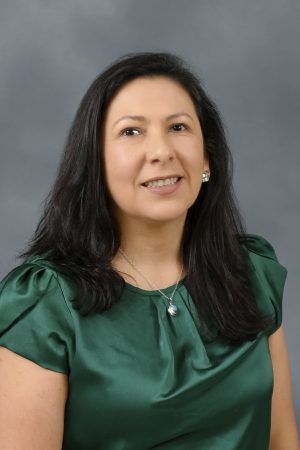Faculty Spotlight: Susana Cisneros

We’re shining our faculty spotlight on Senior Lecturer of Spanish Susana Cisneros, who also serves as Affiliate Faculty in Latin American Studies and facilitator for the Community Innovation Incubator’s Albemarle Rd./Central Ave. project. With more than a decade of experience in community-engaged teaching, Susana brings a deep commitment to collaboration, service, and student impact. She took time to share her journey and insights with us.
Q: How did you get started in community-engaged teaching?
A: I started in community-engaged teaching over a decade ago when I was teaching Spanish for Law Enforcement. As a former attorney, I was curious about the use of language and how I could make the class more real and valuable for students. I invited several law enforcement agencies to collaborate with me. We had conversation tables, bilingual visits to Mecklenburg County Courthouse, and I connected students with Ride Along opportunities with a CMPD police officer. I was a CMPD Volunteer for a few years, serving in various units, including Citizen On Patrol (COP), and I also worked as an interpreter in the Teen Court and Diversion Programs.
Q: When Toye Watson was getting the Community Innovation Incubator started in Albemarle Rd/Central Ave., she asked the community partners who they wanted to work with at UNC Charlotte. Just about all of them mentioned your name. To what do you attribute your strong relationships with partners?
A: I have an active role in the community, collaborating with various leaders in different capacities, including volunteering at Art Fairs, Health Fairs, and Back2School Fairs. My favorite is the Christmas wrapping gift gathering at Camino Community Center. We have an extensive network of volunteers in the City of Charlotte, and we stayed connected and supported each other.
Q: Tell us about one of your current or favorite community-engaged projects.
A: I facilitate the Albemarle Rd/Central Ave community incubator. This is a large, highly diverse territory with many voices. It has been a privilege to work with the stakeholders who have created a community within the community to provide dialogue and discussion. The main goal of this group is to elevate, impact, and engage East Charlotte. Attending the meetings, having hard conversations about the multilayers of needs, and mostly learning about how resilient the East Charlotte community is, has made me question how my actions, talents, and skills can contribute to impacting the diverse youth in the area, mainly because we have many students commuting from that area.
Q: Do you have an example of a small way that a faculty member could get started in community-engaged teaching?
A: A faculty member could reach out to local organizations, especially non-profit organizations, first as a volunteer. Learning how to listen, observe, and participate in community activities can be a good starting point. Generously participating in community activities goes a long way. In community-engaged teaching, we are invested in the long run rather than the transactional task. Teaching is a craft, and working in the community is a privilege for all parties involved, and it should be respected as such.
Q: Where do you see yourself going long-term?
A: Community-engaged teaching has the power to create not only a positive impact on the students but also to strengthen the community and, at the same time, have a long-term effect on all the individuals involved. The long-term goal is to create an ecosystem of empowered individuals who will make a lasting impact and pay it forward to future generations.